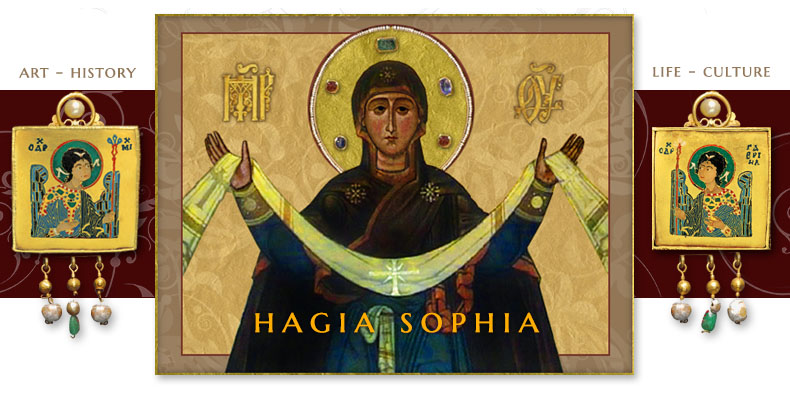
Fate of Hagia Sophia during the Fourth Crusade
From O City of Byzantium - the Annals of Niketas Choniates
I have selected the parts relating to the destruction of the city, the sack and looting of Hagia Sophia from the book. They are separated by lines. There were three major fires in the city from 1203 and 1204. The chart below shows where they occurred and the dates of them. You can learn more about them by visiting this page on the Fires of the Fourth Crusade.
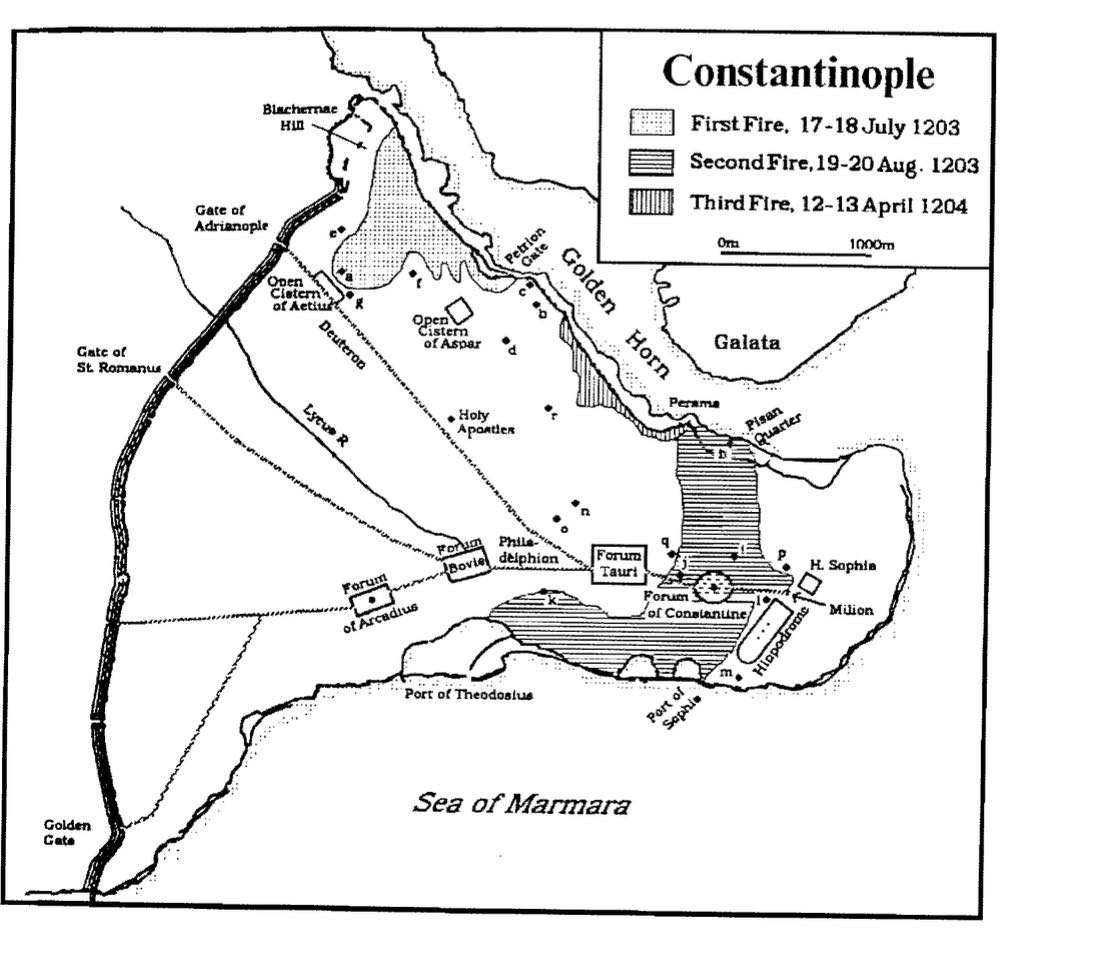 On the nineteenth day of the month of August in the sixth indication of the year 6711 [1203] certain Frenchmen (of old they were called Flemings), Pisans, and Venetians sailed with a company of men across the straits, confident that the monies of the Saracens were a windfall and treasure trove waiting to be taken. This evil battalion put into the City on fishing boats (for there was no one whatsoever to resist their sailing in and out of the City) and without warning fell upon the synagogue of the Agarenes called Mitaton in popular speech; with drawn swords they plundered its possessions. As these outrages were being committed senselessly and beyond every expectation, the Saracens defended themselves by grabbing whatever weapon was at hand; aroused by the tumult, the Romans came running to their assistance. Not as many arrived as should have, but soon, after fighting on the side of these men, the Latins were compelled to withdraw. The latter abandoned hope of resisting with weapons and learned from experience the use of fire; they proposed to resort to fire as the most effective defense and the quickest course of action to subdue the City.
On the nineteenth day of the month of August in the sixth indication of the year 6711 [1203] certain Frenchmen (of old they were called Flemings), Pisans, and Venetians sailed with a company of men across the straits, confident that the monies of the Saracens were a windfall and treasure trove waiting to be taken. This evil battalion put into the City on fishing boats (for there was no one whatsoever to resist their sailing in and out of the City) and without warning fell upon the synagogue of the Agarenes called Mitaton in popular speech; with drawn swords they plundered its possessions. As these outrages were being committed senselessly and beyond every expectation, the Saracens defended themselves by grabbing whatever weapon was at hand; aroused by the tumult, the Romans came running to their assistance. Not as many arrived as should have, but soon, after fighting on the side of these men, the Latins were compelled to withdraw. The latter abandoned hope of resisting with weapons and learned from experience the use of fire; they proposed to resort to fire as the most effective defense and the quickest course of action to subdue the City.
And, indeed, after taking up positions in a goodly number of locations, they set fire to the buildings. The flames rose unbelievably high above the ground throughout that night, the next day, and the following evening as they spread everywhere. It was a novel sight, defying the power of description. While in the past many conflagrations had taken place in the City -no one could cite how many and of what sort they had been - the fires ignited at this time proved all the others to be but sparks. The flames divided, took many different directions and then came together again, meandering like a river of fire. Porticoes collapsed, the elegant structures of the agorae toppled, and huge columns went up in smoke like so much brushwood. Nothing could stand before those flames. Even more extraordinary was the fact that burning embers detached themselves from this roaring and raging fire and consumed buildings at a great distance. Shooting out at intervals, the embers darted through the sky, leaving a region untouched by the blaze, and then destroying it when they turned back and fell upon it. The fire, advancing for the most part in a straight course driven by a north wind, was soon observed to turn aside as though fanned by a south wind, to move aslant, turning this way and that way as it unexpectedly charred and burned everything. Even the Great Church was endangered. Indeed, all the buildings lying in the direction of the Arch of the Milion and adjoining the gallery of Makron, and the structure also called The Synods came crashing to the ground, for neither the baked brick nor the deep set foundations could withstand the heat, and everything within was consumed like candlewicks.
The first kindling of the fire, therefore, began at the synagogue of the Saracens (the latter is situated in the direction of the northern section of the City sloping toward the sea next to the church built in the name of Hagia Eirene, and, spreading breadthwise to the east, it abated at the Great Church; in the west it extended to the district called Perama, and thereafter it burst forth, enveloping the breadth of the City, and expended its fury at the City's southern walls. The most extraordinary thing of all was that the fire, advancing gradually and leaping over the walls, so to speak, ravaged the dwellings beyond, and flying embers burned a ship sailing by. The so-called Porticoes of Domninos were also reduced to ashes, as well as the two covered streets originating at the Milion, one of which extended to the Philadelphion. The Forum of Constantine and everything between the northern and southern extremities were similarly destroyed. Not even the Hippodrome was spared, but the whole section towards the demes as well as everything leading down to [the harbor of] Sophia was engulfed in flames which extended to Bukanon and thence to all structures adjacent to the district of Eleutherios.
The flames, encompassing the City from sea to sea and dividing it as by a great chasm or a river of fire flowing through her midst, made it perilous for loved ones to join one another unless they crossed over in boats. The majority of the City's inhabitants were stripped then of their possessions as the flames reached out to those who were taken by surprise; those who had transferred their goods to other places of shelter also failed to salvage them. The fire, taking a winding course and moving in zigzag paths and branching off in many directions and returning to its starting point, destroyed the goods that had been moved. Woe is me! How great was the loss of those magnificent, most beautiful palaces filled with every kind of delight, abounding in riches, and envied by all....
A measure of the horrors was about to begin, others were already under way, and still others were to follow; the deliberations on amity were disregarded, wholly ignored. Certain wicked Telchines frequently confounded the negotiations. The doge of Venice, Enrico Dandolo, electing to discuss peace terms with the emperor, boarded a trireme and put in at Kosmidion. As soon as the emperor arrived there on horseback, they exchanged views on the peace, paying no heed to anyone else. The demands made by the doge and the remaining chiefs were for the immediate payment of five thousand pounds of gold and certain other conditions which were both galling and unacceptable to those who have tasted freedom and are accustomed to give, not take, commands. These demands were deemed to be heavy Laconian lashes to those for whom the danger of captivity was imminent and universal destruction had erupted, while the doge loudly again declared what had been stated earlier, that the conditions were quite tolerable and not at all burdensome. As the conditions for peace were being negotiated, Latin cavalry forces, suddenly appearing from above, gave free rein to their horses and charged the emperor, who wheeled his horse around, barely escaping the danger, while some of his companions were taken captive. Their inordinate hatred for us and our excessive disagreement with them allowed for no humane feeling between us.
Thereupon [8 April 1204], the enemy's largest ships, carrying the scaling ladders that had been readied and as many of the siege engines as had been prepared, moved out from the shore, and, like the tilting beam of a scale's balance, they sailed over to the walls to take up positions at sufficient intervals from one another. They occupied the region extending in a line from the Monastery of Evergetes to the palace in Blachernai, which had been set on fire, the buildings within razed to the ground, thus stripping it of every pleasant spectacle. Observing these maneuvers, Doukas prepared to resist the enemy. He issued instructions for the imperial pavilion to be set up on the hill of the Pentapoptes monastery whence the warships were visible and the actions of those on board were in full view.
As dawn broke on the ninth day of the month of April in the seventh indiction of the year 6712 [9 April 1204], the warships and dromons approached the walls, and certain courageous warriors climbed the scaling ladders and discharged all manner of missiles against the towers' defenders. All through the day, a battle fraught with groanings was waged. The Romans had the upper hand: both the ships carrying the scaling ladders and the dromons transporting the horses were repulsed from the walls they had attacked without success, and many were killed by the stones thrown from the City's engines.
The enemy ceased all hostilities through the next day and the day after, which was the Lord's day [Sunday, 10-11 April 1204]; on the third day, the twelfth day of the month of April, Monday of the sixth week of the Great Lent, they again sailed towards the City and put in along the shore. By midday our forces prevailed, even though the fighting was more intense and furious than on the preceding Friday. Since it was necessary for the queen of cities to put on the slave's yoke, God allowed our jaws to be constrained with bit and curb because all of us, both priest and people, had turned away from him like a stiff-necked and unbridled horse. Two men on one of the scaling ladders nearest the Petria Gate, which was raised with great difficulty opposite the emperor, trusting themselves to fortune, were the first from among their comrades to leap down onto the tower facing them. When they drove off in alarm the Roman auxiliaries on watch, they waved their hands from above as a sign of joy and courage to embolden their countrymen. While they were jumping onto the tower, a knight by the name of Peter entered through the gate situated there. He was deemed most capable of driving in rout all the battalions, for he was nearly nine fathoms tall and wore on his head a helmet fashioned in the shape of a towered city. The noblemen about the emperor and the rest of the troops were unable to gaze upon the front of the helm's of a single knight so terrible in form and spectacular in size and took to their customary flight as the efficacious medicine of salvation. Thus, by uniting and fusing into one craven soul, the cowardly thousands, who had the advantage of a high hill, were chased by one man from the fortifications they were meant to defend. When they reached the Golden Gate of the Land walls, they pulled down the new-built wall there, ran forth, and dispersed, deservedly taking the road to perdition and utter destruction. The enemy, now that there was no one to raise a hand against them, ran everywhere and drew the sword against every age and sex. Each did not join with the next man to form a coherent battle array, but all poured out and scattered, since everyone was terrified of them.
That evening the enemy set fire to the eastern sections of the City not far from the Monastery of Evergetes; from there the flames spread to those areas that slope down to the sea and terminate in the vicinity of the Droungarios Gate. After despoiling the emperor's pavilion and taking the palace in Blachernai by assault without difficulty, they set up their general headquarters at the Pantepoptes monastery. The emperor went hither and yon through the City's narrow streets, attempting to rally and mobilize the populace who wandered aimlessly about. Neither were they convinced by his exhortations nor did they yield to his blandishments, but the fiercely shaken aegis filled all with despair.
To continue with the remaining portions of my narrative, the day waned and night came on, and each and every citizen busied himself with removing and burying his possessions. Some chose to leave the City, and whoever was able hastened to save himself...
When the emperor had fled in this manner, a pair of youths sober and most skillful in matters of warfare, these being Doukas and Laskaris, bearing the same name as the first emperor of our faith [Constantine], contested the captaincy of a tempest-tossed ship, for they viewed the great and celebrated Roman empire as Fortune's prize, depending upon the chance move of a chessman. They entered the Great Church, evenly matched, competing against each other and being compared one with the other, neither one having more or less to offer than the other, and they were deemed equal in the balance because there was no one to examine them and pass judgment.
Receiving the supreme office by lot, Laskaris refused the imperial insignia; escorted by the patriarch to the Milion, he continuously exhorted the assembled populace, cajoling them to put up a resistance. He pressed those who lift from the shoulder and brandish the deadly iron ax, sending them off to the imminent struggle, reminding them that they should not fear destruction any less than the Romans should the Roman empire fall to another nation: no longer would they be paid the ample wages of mercenaries or receive the far-famed gifts of honor of the imperial guard, and their pay in the future would be counted at a hair's worth. Thus did Laskaris, but not a single person from the populace responded to his blandishments. The ax-bearers agreed to fight for wages, deceitfully and cunningly exploiting the height of the danger for monetary gain, and when the Latin battalions clad in full armor made their appearance, they took flight to save themselves [early morning of 13 April 1204].
The enemy, who had expected otherwise, found no one openly venturing into battle or taking up arms to resist; they saw that the way was open before them and everything there for the taking. The narrow streets were clear and the crossroads unobstructed, safe from attack, and advantageous to the enemy. The populace, moved by the hope of propitiating them, had turned out to greet them with crosses and venerable icons of Christ as was customary during festivals of solemn processions. But their disposition was not at all affected by what they saw, nor did their lips break into the slightest smile, nor did the unexpected spectacle transform their grim and frenzied glance and fury into a semblance of cheerfulness. Instead, they plundered with impunity and stripped their victims shamelessly, beginning with their carts. Not only did they rob them of their substance but also the articles consecrated to God; the rest fortified them- selves all around with defensive weapons as their horses were roused at the sound of the war trumpet.
What then should I recount first and what last of those things dared at that time by these murderous men? 0, the shameful dashing to earth of the venerable icons and the flinging of the relics of the saints, who had suffered for Christ's sake, into defiled places! How horrible it was to see the Divine Body and Blood of Christ poured out and thrown to the ground! These forerunners of Antichrist, chief agents and harbingers of his anticipated ungodly deeds, seized as plunder the precious chalices and patens; some they smashed, taking possession of the ornaments embellishing them, and they set the remaining vessels on their tables to serve as bread dishes and wine goblets. Just as happened long ago, Christ was now disrobed and mocked, his garments were parted, and lots were cast for them by this race; and although his side was not pierced by the lance, yet once more streams of Divine Blood poured to the earth.
The report of the impious acts perpetrated in the Great Church are unwelcome to the ears. The table of sacrifice, fashioned from every kind of precious material and fused by fire into one whole-blended together into a perfection of one multicolored thing of beauty, truly extraordinary and admired by all nations-was broken into pieces and divided among the despoilers, as was the lot of all the sacred church treasures, countless in number and unsurpassed in beauty. They found it fitting to bring out as so much booty the all-hallowed vessels and furnishings which had been wrought with incomparable elegance and craftsmanship from rare materials. In addition, in order to remove the pure silver which overlay the railing of the bema, the wondrous pulpit and the gates, as well as that which covered a great many other adornments, all of which were plated with gold, they led to the very sanctuary of the temple itself mules and asses with packsaddles; some of these, unable to keep their feet on the smoothly polished marble floors, slipped and were pierced by knives so that the excrement from the bowels and the spilled blood defiled the sacred floor. Moreover, a certain silly woman laden with sins, an attendant of the Erinyes, the handmaid of demons, the workshop of unspeakable spells and reprehensible charms, waxing wanton against Christ, sat upon the synthronon and intoned a song, and then whirled about and kicked up her heels in dance.
It was not that these crimes were committed in this fashion while others were not, or that some acts were more heinous than others, but that the most wicked and impious deeds were perpetrated by all with one accord. Did these madmen, raging thus against the sacred, spare pious matrons and girls of marriageable age or those maidens who, having chosen a life of chastity, were consecrated to God? Above all, it was a difficult and arduous task to mollify the barbarians with entreaties and to dispose them kindly towards us, as they were highly irascible and bilious and unwilling to listen to anything. Everything incited their anger, and they were thought fools and became a laughingstock. He who spoke freely and openly was rebuked, and often the dagger would be drawn against him who expressed a small difference of opinion or who hesitated to carry out their wishes.
The whole head was in pain. There were lamentations and cries of woe and weeping in the narrow ways, wailing at the crossroads, moaning in the temples, outcries of men, screams of women, the taking of captives, and the dragging about, tearing in pieces, and raping of bodies heretofore sound and whole. They who were bashful of their sex were led about naked, they who were venerable in their old age uttered plaintive cries, and the wealthy were despoiled of their riches. Thus it was in the squares, thus it was on the corners, thus it was in the temples, thus it was in the hiding places; for there was no place that could escape detection or that could offer asylum to those who came streaming in.
0 Christ our Emperor, what tribulation and distress of men at that time! The roaring of the sea, the darkening and dimming of the sun, the turning of the moon into blood, the displacement of the stars-did they not foretell in this way the last evils? Indeed, we have seen the abomination of desolation stand in the holy place, rounding off meretricious and petty speeches and other things which were moving definitely, if not altogether, contrariwise to those things deemed by Christians as holy and ennobling the word of faith.
Such then, to make a long story short, were the outrageous crimes committed by the Western armies against the inheritance of Christ. Without showing any feelings of humanity whatsoever, they exacted from all their money and chattel, dwellings and clothing, leaving to them nothing of all their goods. Thus behaved the brazen neck, the haughty spirit, the high brow, the ever-shaved and youthful cheek, the bloodthirsty right hand, the wrathful nostril, the disdainful eye, the insatiable jaw, the hateful heart, the piercing and running speech practically dancing over the lips. More to blame were the learned and wise among men, they who were faithful to their oaths, who loved the truth and hated evil, who were both more pious and just and scrupulous in keeping the commandments of Christ than we "Greeks." Even more culpable were those who had raised the cross to their shoulders, who had time and again sworn by it and the sayings of the Lord to cross over Christian lands without bloodletting, neither turning aside to the right nor inclining to the left, and to take up arms against the Saracens and to stain red their swords in their blood; they who had sacked Jerusalem, and had taken an oath not to marry or to have sexual intercourse with women as long as they carried the cross on their shoulders, and who were consecrated to God and commissioned to follow in his footsteps.
In truth, they were exposed as frauds. Seeking to avenge the Holy Sepulcher, they raged openly against Christ and sinned by overturning the Cross with the cross they bore on their backs, not even shuddering to trample on it for the sake of a little gold and silver. By grasping pearls, they rejected Christ, the pearl of great price, scattering among the most accursed of brutes the All-Hallowed One. The sons of Ismael did not behave in this way, for when the Latins overpowered Sion the Latins showed no compassion or kindness to their race. Neither did the Ismaelites neigh after Latin women, nor did they turn the cenotaph of Christ into a common burial place of the fallen, nor did they transform the entranceway of the life-bringing tomb into a passageway leading down into Hades, nor did they replace the Resurrection with the Fall. Rather, they allowed everyone to depart in exchange for the payment of a few gold coins; they took only the ransom money and left to the people all their possessions, even though these numbered more than the grains of sand.Thus the enemies of Christ dealt magnanimously with the Latin infidels, inflicting upon them neither sword, nor fire, nor hunger, nor persecution, nor nakedness, nor bruises, nor constraints. How differently, as we have briefly recounted, the Latins treated us who love Christ and are their fellow believers, guiltless of any wrong against them.
O City, City, eye of all cities, universal boast, supramundane wonder, wet nurse of churches, leader of the faith, guide of Orthodoxy, beloved topic of orations, the abode of every good thing! 0 City, that hast drunk at the hand of the Lord the cup of his fury! 0 City, consumed by a fire far more drastic than the fire which of old fell upon the Pentapolis!. What shall I testify to thee? What shall I compare to thee? The cup of thy destruction is magnified," says Jeremias, who was given to tears as he lamented over ancient Sion. What malevolent powers have desired to have you and taken you to be sifted? What jealous and relentless avenging demons have made a riotous assault upon you in wild revel? If these implacable and crazed suitors neither fashioned a bridal chamber for thee, nor lit a nuptial torch for thee, did they not, however, ignite the coals of destruction?
O prolific City, once garbed in royal silk and purple and now filthy and squalid and heir to many evils, having need of true children! 0 City, formerly enthroned on high, striding far and wide,'535 magnificent in comeliness and more becoming in stature ; now thy luxurious garments and elegant royal veils are rent and torn; thy flashing eye has grown dark, and thou art like unto an aged furnace woman all covered with soot, and thy formerly glistening and delightful countenance is now furrowed by loose wrinkles. I shall forego describing those who set words to the music of the lyre and sang of thy calamities and, drunk with wine, turned thy tragedy into a comedy, making a profession out of the farcical recitation of thine afflictions: blows struck with the fist and the foot, bruises, moreover, and black eyes inflicted upon thee every hour of the day; for by God's will thou hast provoked to jealousy the foolish nations, or rather, those people who are not truly nations but obscure and scattered tribes, and if thou didst not give birth to the majority of them, thou didst, however, raise them up and provide them with the fat of wheat.
"Who shall save thee? Or who shall comfort thee? Or who shall turn back to inquire after thy welfare?" Thus spake the much-wailing Jeremias. Who shall dress in thy former raiment? When shall thou hear those divinely inspired words: "Awake, awake, stand up, 0 City, that hast drunk the cup of my fury and the cup of calamity." Put on thy strength, put on thy glory."" Shake off the dust and arise. Put off the band of thy neck. Enlarge the place of thy tent, and of thy curtains."" Fear not because thou hast been put to shame, neither be confounded because thou wast reproached, and all that go by the way have clapped their hands at thee; they have hissed and shaken their heads and have said, "This is the city, the crown of glory and of joy of all the earth," and, "How does the city that was filled with people sit as a widow, and how has she, princess among provinces, become tributary?" For thy God has said, "For a little while I left thee, but with great mercy will I have compassion upon thee. In a little wrath I turned away my face, but with everlasting mercy will I have compassion upon thee."
Soon after our empire had fallen to the lot of the French and the high priesthood had similarly been allotted to the Venetians because of the judgments known to the Lord, the maker and pilot of this terrestrial ship, there arrived from Venice as patriarch of Constantinople [end of July 1204] a certain Thomas by name. He was of middle age and fatter than a hog raised in a pit; his face was clean-shaven, as is the case with the rest of his race, and his chest was plucked smoother than pitchplaster; he wore a ring on his hand, and sometimes he wore leather coverings which were fitted to his fingers. His clerical assistants and attendants at the holy altar were seen to be identical in everything with their primate, in dress and regimen and in the cropping of the beard.
Exhibiting from the very outset, as they say, their innate love of gold, the plunderers of the queen city conceived a novel way to enrich themselves while escaping everyone's notice. They broke open the sepulchers of the emperors which were located within the Heroon so erected next to the great temple of the Disciples of Christ [Holy Apostles] and plundered them all in the night, taking with utter lawlessness whatever gold ornament, or round pearls, or radiant, precious, and incorruptible gems that were still preserved within. Finding that the corpse of Emperor Justinian had not decomposed through the long centuries, they looked upon the spectacle as a miracle, but this in no way prevented them from keeping their hands off the tomb's valuables: In other words, the Western nations spared neither the living nor the dead, but beginning with God and his servants, they displayed complete indifference and irreverence to all.
Not long afterwards, they pulled down the ciborium of the Great Church that weighed many tens of thousands of pounds of the purest silver and was thickly overlaid with gold.

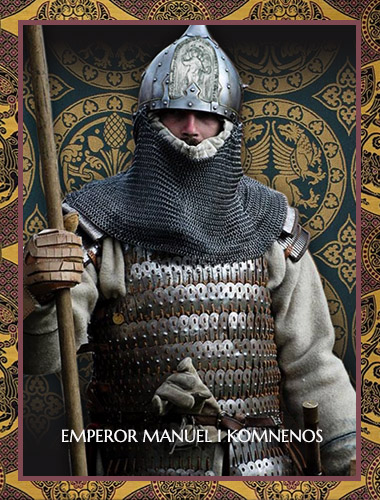


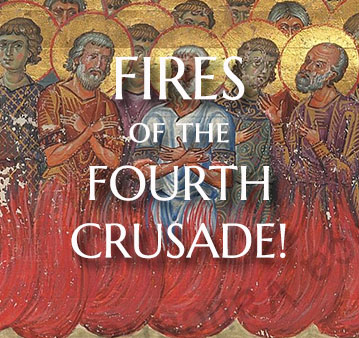
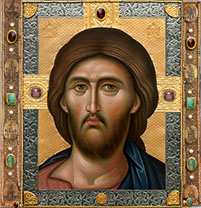 click here for icons of christ
click here for icons of christ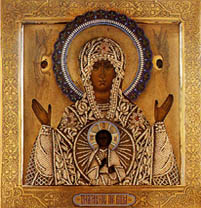 click here for icons of the theotokos
click here for icons of the theotokos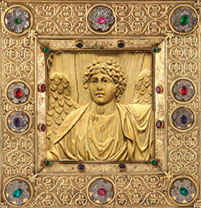 click here for icons of angels
click here for icons of angels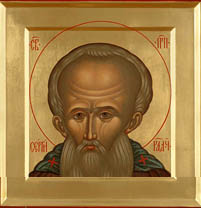 click here for icons of saints
click here for icons of saints








